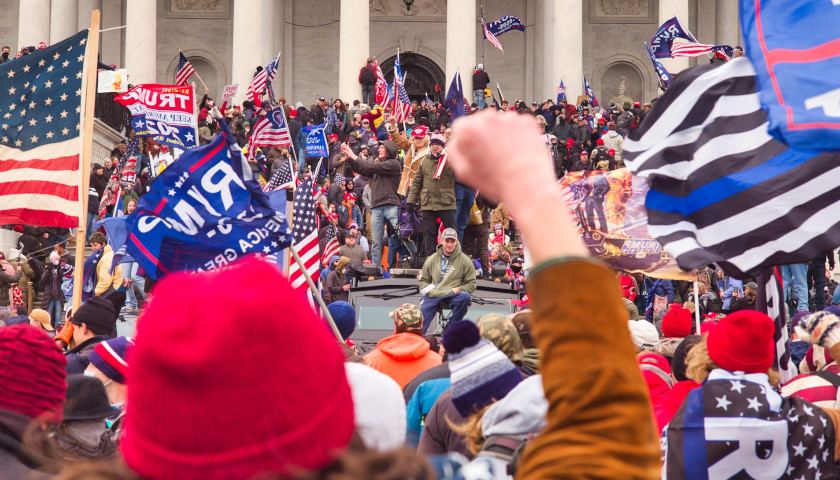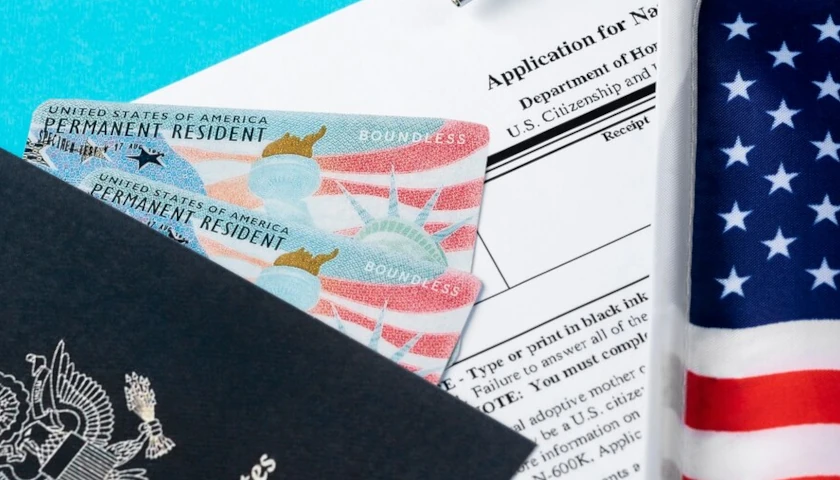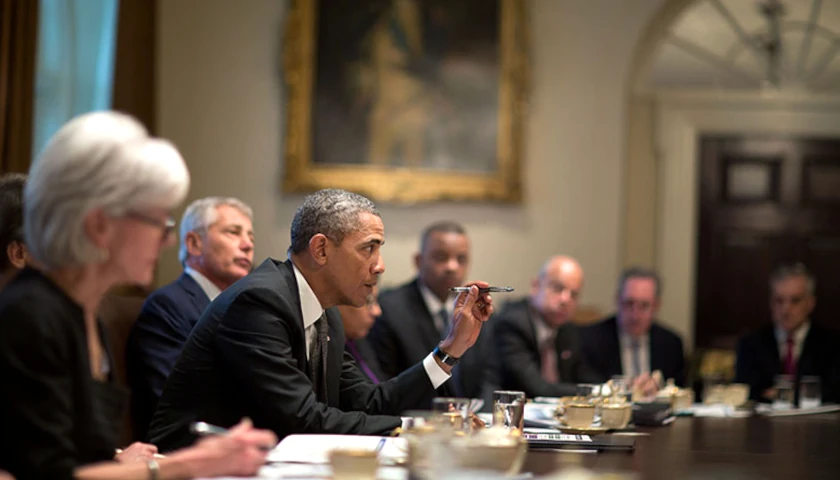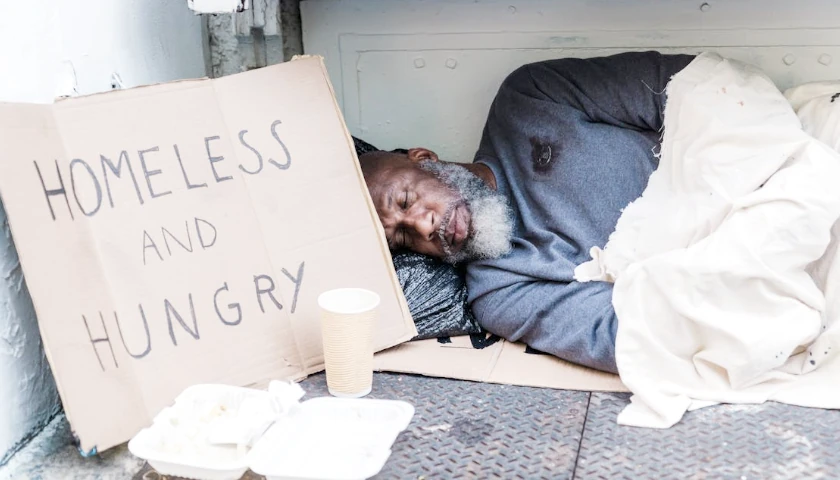by Julie Kelly
To hear federal prosecutors tell it, Guy Wesley Reffitt almost single-handedly organized and led a bloodthirsty mob to overtake Congress on January 6, 2021.
One of the first protesters arrested in the Justice Department’s “shock and awe” dragnet of Donald Trump supporters, Reffitt was immediately indicted on numerous offenses. He spent more than a year in the D.C. gulag set aside for Americans who protested Joe Biden’s election under pretrial detention orders sought by the Justice Department—and he was the first January 6 defendant to stand trial in a city that voted nearly 93 percent for Biden in 2020.
In a matter of a few hours in March, 12 residents of the nation’s capital—not only one of the most lopsidedly Democratic cities in the country but one whose residents view the events of January 6 as an intrusion of their private fiefdom—found Reffitt guilty on all charges: two counts of civil disorder, two counts of obstruction, and one count of carrying a handgun on restricted grounds. (Prosecutors came up with the firearms charges months after he was initially indicted, claiming a holster he wore that day contained a semi-automatic handgun.)
Without question, Reffitt engaged in bad behavior that afternoon; he recorded himself making derogatory comments about House Speaker Nancy Pelosi (D-Calif.) and Senate Majority Leader Mitch McConnell (R-Ky.) before confronting Capitol police on the steps outside the building. The government’s most incriminating evidence in the case came from Reffitt’s teenage son, who secretly taped conversations with his father a few days after Reffitt returned to their Texas home, which the FBI raided on January 16, 2021. (I wrote about the case here.)
But Reffitt’s misconduct doesn’t come close to the overdramatic if not wholly dishonest account described in a 58-page sentencing recommendation the Justice Department filed last week. And it does not make him, or others in similar circumstances, part of a domestic terrorism plot as the Biden regime now insists.
Despite the fact Reffitt traveled to D.C. with only one other person and never entered the building, Jeffery Nestler, the federal prosecutor handling the case, repeatedly alleged that Reffitt played a “central role in leading a mob that attacked the United States Capitol.” Rather than show remorse for his action, Nestler wrote, “Reffitt returned home to Texas on January 8, triumphant about the integral role he played in the attack on our democracy.”
For several pages, Nestler portrays Reffitt as a dangerous militia leader who used his influence to initiate a violent assault against lawmakers that afternoon. “Reffitt did not intend to simply obstruct Congress’s certification of the Electoral College vote. Rather, Reffitt intended to physically remove the legislators from the building (using his firearm and flexicuffs, and the power of the crowd) and actually ‘take over’ Congress,” Nestler wrote. (Reffitt’s companion, an alleged militia member, was not charged for similar conduct after he agreed to cooperate with the government.)
Reffitt, however, wasn’t convicted of attempting to kidnap members of Congress or seize the Capitol building. He didn’t build a weapon of mass destruction, torch federal property, or plot to kill government leaders—crimes that are normally associated under the law with acts of terrorism. Prosecutors didn’t convince jurors that Reffitt was a self-styled American jihadist who developed elaborate plans to overthrow the U.S. government on January 6.
But that is precisely what the Justice Department now wants a federal judge to conclude—and punish Reffitt accordingly.
Nestler and his boss, U.S. Attorney for the District of Columbia Matthew Graves, are seeking a 15-year prison sentence based in part on a terrorism enhancement provision in federal sentencing guidelines. And the alleged crime of terrorism? The vague “obstruction of an official proceeding” felony is a post-Enron law intended to prevent evidence tampering that has been bastardized by Biden’s Justice Department to criminalize political protest in America.
“The Court should depart upward under U.S.S.G. § 3A1.4 (“Terrorism”), because Reffitt’s conviction—for obstructing Congress’s certification of the Electoral College vote ‘was calculated to influence or affect the conduct of government by intimidation or coercion, or to retaliate against government conduct,’” Nestler argued, citing requirements under sentencing guidelines to support additional jail time. (“[T]he terrorism enhancement is applicable where a defendant acts according to a plan—whether developed over a long period of time or developed in a span of seconds—with the object of influencing government conduct or retaliating against a government.”
Now, most Americans who aren’t brainwashed members of the national news media or Democratic Party consider attempts to influence the government a fundamental constitutional right. The notion that protesting any public body, especially Congress, makes one a “domestic terrorist” if the protest gets out of hand isn’t just absurd; it sets an extremely dangerous precedent. Which is precisely what this Justice Department wants to do.
Further, nothing Reffitt did on January 6 came close to the organized, violent rioting that was intended to disrupt Donald Trump’s inauguration in 2017. Nor did it approach the weeks of protests, which included the occupation of Capitol buildings, breach of police lines, and threats to sitting members of Congress, related to the confirmation of Brett Kavanaugh in 2018. And of course, Reffitt was not involved in riots coordinated by powerful, monied activist groups following the death of George Floyd in 2020, violence that actually terrorized the American people for months, causing numerous fatalities and at least $2 billion in property damages.
None of those events has been cited as examples of “domestic terror” by this regime—but FBI Director Christopher Wray officially designated January 6, a four-hour disturbance that resulted in the deaths of four Trump supporters, an act of domestic terror. Wray’s proclamation, made under oath to a Congressional committee in March 2021, gave prosecutors, judges, and the media all the ammunition they needed to brand January 6 protesters, even nonviolent offenders, as America’s version of al-Qaeda.
This isn’t without tragic consequences.
In at least a half dozen cases, prosecutors have asked judges to throw the book at defendants who plead guilty to obstruction ostensibly as a deterrence measure. “The need to deter others is especially strong in cases involving domestic terrorism, which the breach of the Capitol certainly was,” prosecutors wrote in the case of Jacob Chansley, the so-called “QAnon shaman” who spent nearly a year in solitary confinement before prosecutors tortured a plea deal out of him on obstruction. D.C. District Court Judge Royce Lamberth agreed and sentenced Chansley, whom he called the “epitome” of January 6 even though he committed no violence, to 41 months in prison.
When Matthew Perna, who also pleaded guilty to obstruction, learned Graves’ office would seek years in prison for the same reasons it had in Chansleys’ case, he hanged himself in his garage on February 25 of this year.
But this is the first time the government has asked for more jail time specifically under the terrorism provision in federal sentencing rules. If Judge Dabny Friedrich agrees with the Justice Department at Reffitt’s sentencing hearing on August 1, it would turn a nonviolent felony that temporarily disrupted a largely ceremonial process on January 6 into a crime of domestic terrorism.
Nestler, in a way admitting the absurdity of it all, attempts to carve out an exception for Trump supporters: “[The] crimes that Reffitt and others like him committed on January 6 are unprecedented,” Nestler wrote. “These crimes defy statutorily appropriate comparisons to other obstructive related conduct in other cases. To try to mechanically compare other—defendants prior to January 6, 2021, would be a disservice to the magnitude of what the riot entailed and signified.”
Just another example of the double standard of justice from this vengeful regime. And as Graves’ office continues its undefeated streak before D.C. juries, Trump supporters trapped in a legal circle of hell in the nation’s capital can expect more of this, if not worse.
– – –
Julie Kelly is a political commentator and senior contributor to American Greatness. She is the author of January 6: How Democrats Used the Capitol Protest to Launch a War on Terror Against the Political Right and Disloyal Opposition: How the NeverTrump Right Tried―And Failed―To Take Down the President. Her past work can be found at The Federalist and National Review. She also has been featured in the Wall Street Journal, The Hill, Chicago Tribune, Forbes, and Genetic Literacy Project. She is the co-host of the “Happy Hour Podcast with Julie and Liz.” She is a graduate of Eastern Illinois University and lives in suburban Chicago with her husband and two daughters.
Photo “January 6 Riot” by Brett Davis. CC BY-NC 2.0.








